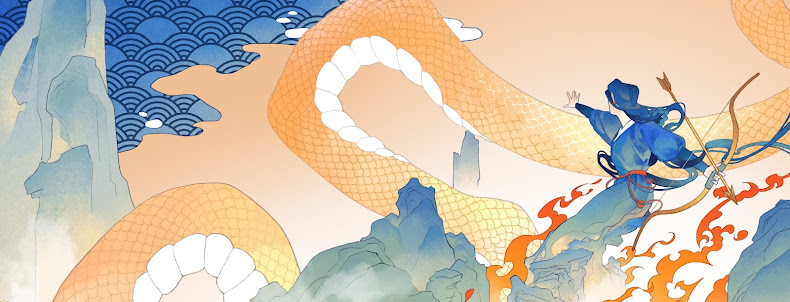This
is sequel #2 in The Poppy War trilogy. It was as compelling as the first novel.
The writing is lush and scenes are graphically presented. Rin’s internal
torment and physical pain felt so real on the page!
The
plot thickens as the Nikan Empire is stricken by the aftermath of the Mugenese
invasion and the power struggles between the northern Warlords led by the
Empress and the southern Warlords headed by the Dragon Republic leader Vaisra,
Nezha’s father.
We
see Rin guilt-ridden over her using the fire power of the Phoenix vindictively
to annihilate the whole Mugenese island. While at a loss as to what to do next,
Rin gets reunited with Kitay in the city under the control of the pirate queen
Moag. Nezha appears at this juncture and convinces them both to join forces
with the Dragon Republic to resist the imminent attack mounted by the Empress
and her allies. Rin learns that Vaisra intends to enlist the help of Hesperia,
the blue-eyed foreign nation, but she remains wary of the latter’s true
intentions.
Meanwhile,
her fire power is lost due to a god’s blockage. A fierce naval battle between
the two sides breaks out at Lake Boyang. The Empress’s side has the help of the
wind-commanding shaman Feylen, which gives her the edge. The plot then branches
off to tell the history of enmity between the steppe shamans and the Nikan
imperial rulers. By chance, with the help of a steppe shaman, Rin’s fire power
is restored and enhanced by a spiritual bond forged with Kitay. They are ready
to protect the Dragon Republic, but in the end find they have backed the wrong
side. Unexpected perfidy forces Rin to assume a life-changing role in the civil war.
Here
are some passages that I found resonating:
The sheer arrogance, Rin thought. It
must be nice, possessing all the power, so you could approach geopolitics like
a chess game, popping in curiously to observe which countries deserved your aid
and which didn’t.
It’s not about who you are, it’s about
how they see you. And once you’re mud in this country, you’re always mud.
‘Those devils are going to destroy our
world. The Hesperians have a singular vision for the future, and we are not in
it.’
The Nikara had been fighting among
themselves for a millennium. Were they going to stop just because they could
vote for their rulers? And who was going to vote for those rulers? People like
Auntie Fang?
He could spout all the ideology he
wanted, but she knew better. The Nikara were never going to rule themselves,
not peacefully, because there was no such thing as a Nikara at all.
I’m
giving this novel 4 stars.





